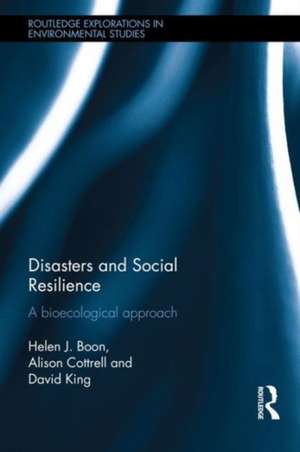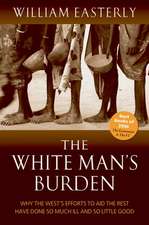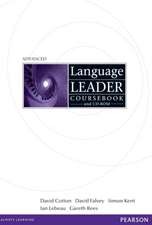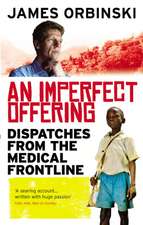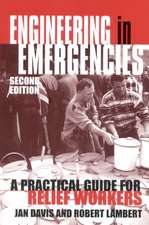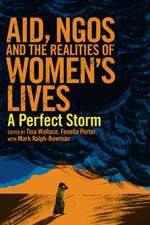Disasters and Social Resilience: A bioecological approach: Routledge Explorations in Environmental Studies
Autor Helen Boon, Alison Cottrell, David Kingen Limba Engleză Hardback – 12 mai 2016
Disasters and Social Resilience fills this gap by introducing to the field of disaster studies a fresh methodology and a model for examining and measuring impacts and responses to disasters. Urie Bronfenbrenner’s bioecological systems theory, which is used to look at communities holistically, is outlined and illustrated through a series of chapters, guiding the reader from the theory's underpinnings through research illustrations and applications focused on each level of Bronfenbrenner’s ecosystems, culminating in an integration chapter. The final chapter provides policy recommendations for local and national government bodies and emergency providers to help individuals and communities prepare and withstand the effects of a range of disasters.
This book will be of great interest to scholars and students of disaster and emergency management, disaster readiness and risk reduction (DRR), and to scholars and students of more general climate change and sustainability studies.
Din seria Routledge Explorations in Environmental Studies
-
 Preț: 281.77 lei
Preț: 281.77 lei -
 Preț: 243.62 lei
Preț: 243.62 lei -
 Preț: 288.87 lei
Preț: 288.87 lei -
 Preț: 294.72 lei
Preț: 294.72 lei -
 Preț: 326.82 lei
Preț: 326.82 lei -
 Preț: 310.88 lei
Preț: 310.88 lei -
 Preț: 310.29 lei
Preț: 310.29 lei -
 Preț: 326.49 lei
Preț: 326.49 lei -
 Preț: 311.41 lei
Preț: 311.41 lei -
 Preț: 311.41 lei
Preț: 311.41 lei -
 Preț: 279.47 lei
Preț: 279.47 lei -
 Preț: 309.12 lei
Preț: 309.12 lei -
 Preț: 378.44 lei
Preț: 378.44 lei -
 Preț: 416.22 lei
Preț: 416.22 lei -
 Preț: 444.62 lei
Preț: 444.62 lei - 42%
 Preț: 234.90 lei
Preț: 234.90 lei -
 Preț: 480.62 lei
Preț: 480.62 lei - 12%
 Preț: 325.34 lei
Preț: 325.34 lei -
 Preț: 443.65 lei
Preț: 443.65 lei - 18%
 Preț: 1056.28 lei
Preț: 1056.28 lei -
 Preț: 442.50 lei
Preț: 442.50 lei -
 Preț: 461.50 lei
Preț: 461.50 lei -
 Preț: 421.63 lei
Preț: 421.63 lei -
 Preț: 449.41 lei
Preț: 449.41 lei - 18%
 Preț: 1060.52 lei
Preț: 1060.52 lei - 18%
 Preț: 1109.99 lei
Preț: 1109.99 lei - 25%
 Preț: 852.63 lei
Preț: 852.63 lei -
 Preț: 389.38 lei
Preț: 389.38 lei - 18%
 Preț: 699.21 lei
Preț: 699.21 lei - 15%
 Preț: 418.51 lei
Preț: 418.51 lei -
 Preț: 416.22 lei
Preț: 416.22 lei -
 Preț: 407.57 lei
Preț: 407.57 lei - 18%
 Preț: 1056.28 lei
Preț: 1056.28 lei - 26%
 Preț: 846.09 lei
Preț: 846.09 lei -
 Preț: 438.30 lei
Preț: 438.30 lei - 15%
 Preț: 423.09 lei
Preț: 423.09 lei -
 Preț: 448.44 lei
Preț: 448.44 lei - 13%
 Preț: 296.95 lei
Preț: 296.95 lei - 18%
 Preț: 1167.71 lei
Preț: 1167.71 lei - 16%
 Preț: 65.03 lei
Preț: 65.03 lei - 25%
 Preț: 767.88 lei
Preț: 767.88 lei
Preț: 1055.51 lei
Preț vechi: 1287.22 lei
-18% Nou
Puncte Express: 1583
Preț estimativ în valută:
201.97€ • 211.41$ • 168.10£
201.97€ • 211.41$ • 168.10£
Carte tipărită la comandă
Livrare economică 31 martie-14 aprilie
Preluare comenzi: 021 569.72.76
Specificații
ISBN-13: 9781138933125
ISBN-10: 1138933120
Pagini: 220
Ilustrații: 61
Dimensiuni: 156 x 234 x 18 mm
Greutate: 0.48 kg
Ediția:1
Editura: Taylor & Francis
Colecția Routledge
Seria Routledge Explorations in Environmental Studies
Locul publicării:Oxford, United Kingdom
ISBN-10: 1138933120
Pagini: 220
Ilustrații: 61
Dimensiuni: 156 x 234 x 18 mm
Greutate: 0.48 kg
Ediția:1
Editura: Taylor & Francis
Colecția Routledge
Seria Routledge Explorations in Environmental Studies
Locul publicării:Oxford, United Kingdom
Public țintă
PostgraduateCuprins
1. Introduction 2. Rationale for the use of Bronfenbrenner’s bioecological systems theory to examine resilience 3. Methodology: An application of Bronfenbrenner’s bioecological systems theory 4. Individuals’ disaster resilience 5. The microsystem in disaster resilience 6. The mesosystem in disaster resilience 7. The Exosystem and the Community 8. The Macrosystem 9. The Chronosystem Conclusion
Notă biografică
Helen J. Boon is a Senior Lecturer at the College of Arts, Society and Education, Division of Tropical Environments and Societies at James Cook University, Australia.
Alison Cottrell is an Associate Professor with the Centre for Disaster Studies and Associate Dean Research Education within the College of Marine and Environmental Sciences at James Cook University, Australia.
David King is an Associate Professor in the College of Marine and Environmental Sciences at James Cook University, Australia, and is Director of the Centre for Disaster Studies, and the Centre for Tropical Urban and Regional Planning.
Alison Cottrell is an Associate Professor with the Centre for Disaster Studies and Associate Dean Research Education within the College of Marine and Environmental Sciences at James Cook University, Australia.
David King is an Associate Professor in the College of Marine and Environmental Sciences at James Cook University, Australia, and is Director of the Centre for Disaster Studies, and the Centre for Tropical Urban and Regional Planning.
Recenzii
"The book makes a useful contribution to disaster management by highlighting the complexities of the concept of social resilience in the context of disasters. It provides an opportunity for the reader to reflect on social resilience and disasters."
Michael Tarrent, Adjunct Associate Professor at Queensland University of Technology in Disasters and Social Resilience: a bioecological approach
Michael Tarrent, Adjunct Associate Professor at Queensland University of Technology in Disasters and Social Resilience: a bioecological approach
Descriere
This book introduces to the field of disaster studies a fresh methodology and model for examining and measuring impacts and responses to disasters. Urie Bronfenbrenner’s bioecological systems theory is widely used in psychological and developmental fields, and offers a clear theoretical lens through which to examine the degrees of influence that exist elements when disaster occurs. This book will be of great interest to scholars and students of disaster and emergency management, disaster readiness and risk reduction (DRR) and sustainability studies more generally.
